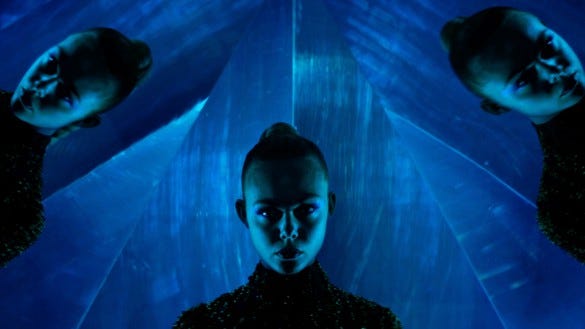The Neon Demon
“The Neon Demon” is Nicolas Winding Refn's search for the perfect sensual-cinematic high, looking inward and wondering if his deep devotion to fetish and fashion is reason for disgust. If you did not like “Only God Forgives,” you won't like “The Neon Demon.” Do you dig him? Maybe you'll dig this. This is not the movie that will convert you to Nicolas Winding Refn or convince you he's made a shift to substance over style. It is a critique on glamour, shot in glamorous fashion. It is beautiful, sensual, extremely particular in construction. It is shallow, slow, blunt and as deeply self-enamored. It is one of Refn's best expressions of self; it may be his least accessible movie.

Elle Fanning plays Jesse, an aspiring model who comes to Los Angeles to make a career.
“I can't sing, I can't dance, I can't act, but I'm pretty. And I can make money being pretty.”
And she does; she is beautiful. So beautiful, young, pure, that every single person who meets her falls in love with her. They want her looks. They want to stare at her for hours. Refn uses every tool in his visual arsenal to make sure we do, too — but to an unconventional extent. He avoids filming Jesse in a sexualized manner; he shoots her like a model in a fashion shoot, emphasis on her face rather than her body. He objectifies her for us without sexualizing her for us. He wants us to fall in love with her purity of heart and her innocence. He knows that's what we want from a horror movie. The tough virgin. The innocence lost.
Jesse becomes acquainted with Ruby (Jena Malone), Gigi (Bella Heathcote) and Sarah (Abbey Lee). The three of them corner her like a pack of vampires, questioning what she's done to deserve the attentions of star photographers and famous agencies. “Who did you f---?” Well, nobody. And that infuriates them. Jesse inadvertently humiliates each of them, and they seek revenge against her. That isn't the horror aspect of “The Neon Demon,” though. The true horror is the environment Jesse is stuck in, one that objectifies and sexualizes beauty, uses it up and throws it in the trash.
You've seen movies about idealistic young women chewed up by the world. Not quite like this.
Like many classic horror setups, sex is always a threat in “The Neon Demon.” Unlike many horror movies, rape is never used glamorously – it is never brought forward as a consequence, a driving action for the character or a set-piece. But it is a constant threat, a source of discomfort, because in “The Neon Demon” the act of objectification is synonymous with rape. The loss of agency, the loss of self to the pursuit and practice of public beauty. Refn maintains the audience's awareness of the possibility while never making it present in the flesh. Rape is a difficult subject to handle, particularly in the horror genre, but I like what Refn chose to do here.
To throw in a real-world analogy: When Jennifer Lawrence had her nudes hacked off her iPhone and stated that anyone looking at those pictures was committing an act of rape. I know men and women who sought those out. I did. Out of curiosity and titillation. Because she's beautiful, and before she wrote about it I never felt myself complicit in an unwanted act. It had never crossed my mind before that. Physical rape is never literal on the screen in “The Neon Demon” but the threat of it, the awareness of its brutal and awful possibility creates the tension that drives much of the film. It is a horror movie that dwells, with disgust, on that in which casual voyeurism makes us complicit.
“The Neon Demon” is billed as a horror movie, and don't fret, blood is certainly spilled.
Cliff Martinez, Refn's constant composer, is back for this one, and it is probably his best score. Haunting, dramatic, with bizarre tinges of 80's synth-music. There are certainly moments where “The Neon Demon” feels visually extragalactic, not out of place in a science-fiction story.
Of course, “The Neon Demon” features a lot – a lot – of imagery inserted into the movie that comes across as corny. It isn't a terribly subtle movie. A mountain lion is found in Elle's bed! Keanu Reeves plays her landlord, a pervert and a bastard who offers glimpses of the “real 'Lolita' shit” in room 214. And the last scene, disgusting but cartoonish in its overtness. The complete and utter lack of subtlety in the symbolism is right at home in a movie about lack of depth, about a dog-eat-dog made literal.
Despite corniness, despite how straightforward its themes are, “The Neon Demon” is nonetheless worth a watch. Refn continues to be an controversial and important voice in art cinema.


